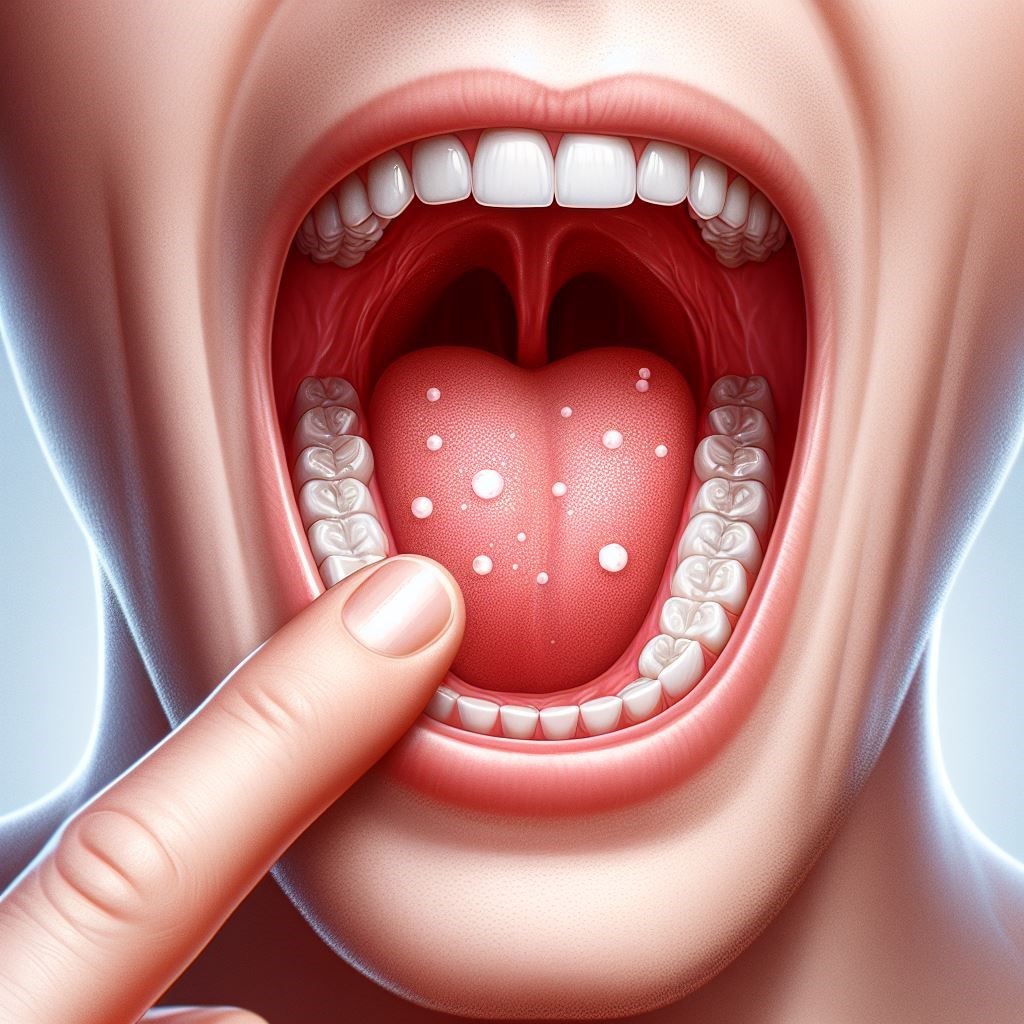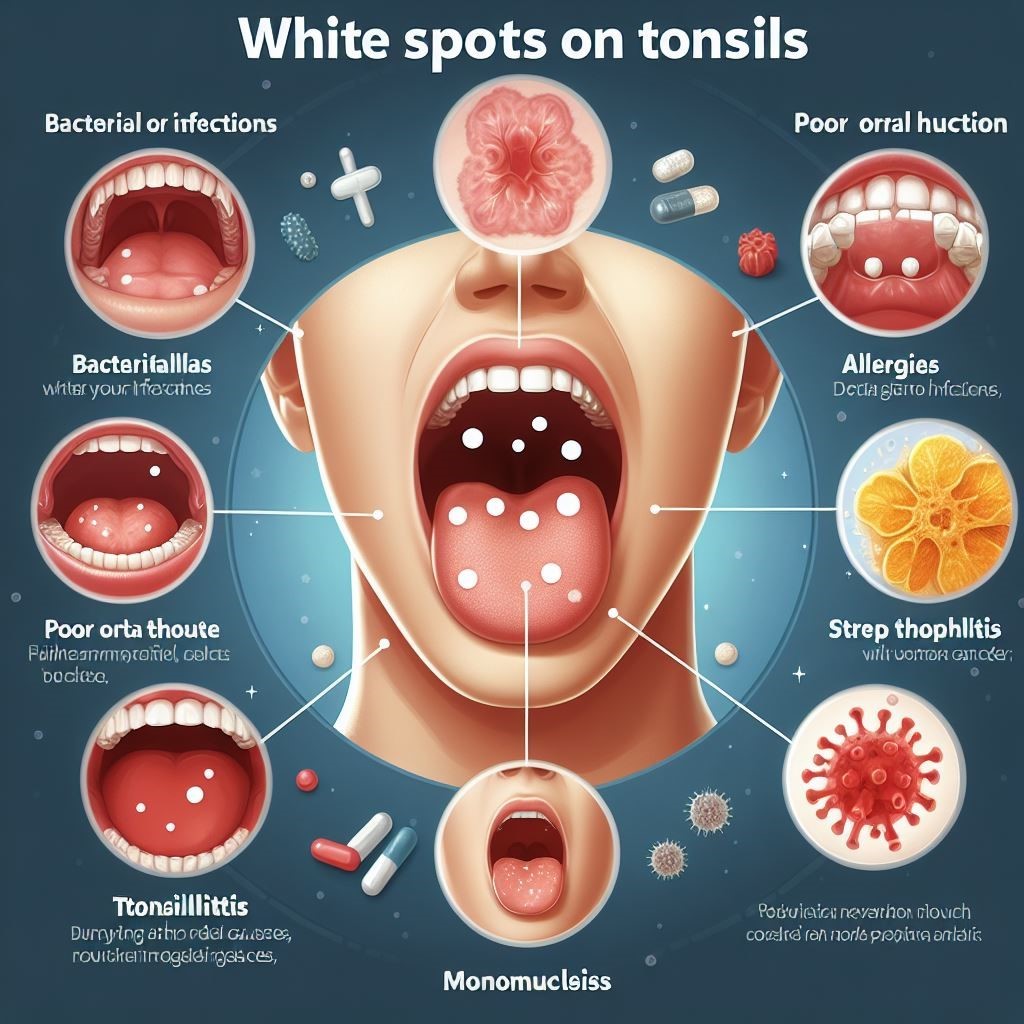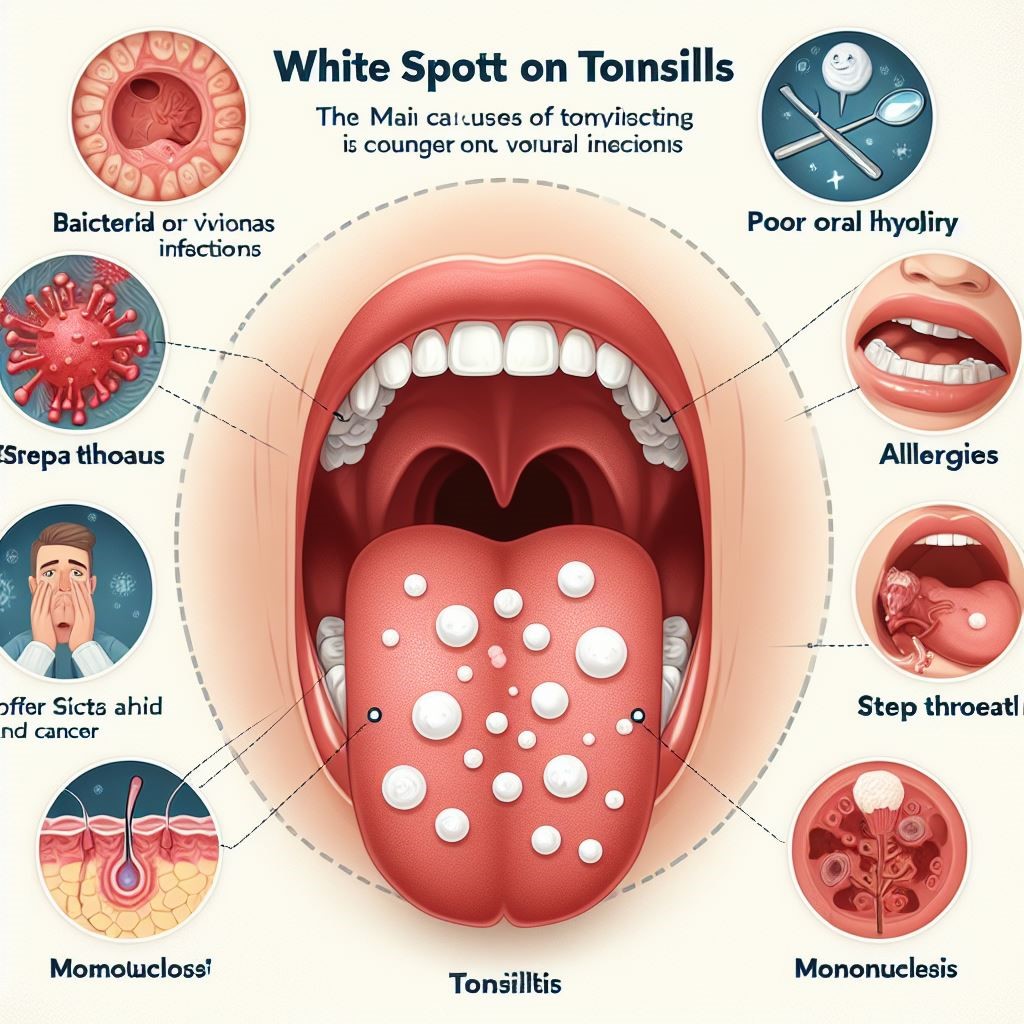White Spots on Tonsils: Decoding Causes and Quick Solutions
Explore our guide on white spots on tonsils, decoding causes, and discovering quick solutions. Gain insights into your health today!
Introduction
Noticing white spots on tonsils can be alarming. However, in most cases, these spots are harmless and can be managed at home. Unveiling the typical reasons behind white spots on tonsils, this piece offers practical advice for swift relief. Read on to decode this symptom and implement solutions to support your health.
White Spots on Tonsils Symptoms

Some signs your white spots may be problematic include:
- Extreme pain or trouble swallowing
- Fever above 101F
- Dehydration
- Large, swollen, or ulcerated spots
- Unusual weakness or weight loss
- Ear pain or rash, along with spots
Milder symptoms like bad breath, sore throat, or discomfort swallowing can also occur. The severity depends on the cause. Keep an eye on any symptoms accompanying spots.
White Spots on Tonsils Causes

There are several explanations for the appearance of white spots on tonsils:
- Tonsil Stones
It is also called tonsillitis, which are calcified clusters lodged in the tonsils’ crypts. Tiny spots on the tonsils may appear when a combination of mucus, bacteria, and debris occurs. While frequently lacking noticeable symptoms, these spots can lead to issues such as unpleasant breath, a scratchy throat, or challenges in swallowing. Tonsil stones may not consistently manifest symptoms, yet they have the potential to result in problems like breath, a sore throat, or difficulty swallowing in certain instances.
Tonsillitis refers to inflammation and infection of the tonsils, often caused by viruses or bacteria like strep. This ailment can result in the enlargement of tonsils, characterized by their redness and the presence of white spots. Additional signs of tonsillitis encompass fever, difficulty in swallowing, unpleasant breath, and the tenderness of lymph nodes beneath the jaw.
- Mouth Fungus
It is a fungal infection typically caused by an overgrowth of yeast called Candida. It appears as creamy white spots or lesions on the tonsils and other areas of the mouth.
Thrush may occur after taking antibiotics, disturbing the natural balance of microbes in the mouth.
- Leukoplakia
Leukoplakia manifests as thickened white spots on the mouth’s mucous membranes. It is associated with chronic irritation and increased cancer risk.
While leukoplakia can affect the tonsils, it more commonly develops on the gums, cheeks, or tongue.
- Strep Throat
Strep throat arises from an infection instigated by bacteria known as Group A Streptococcus. In addition to white spots on tonsils, strep can lead to red, swollen tonsils, headache, fever, and throat pain.
Strep throat is highly contagious and requires treatment with antibiotics to prevent complications like rheumatic fever.
White Spots on Tonsils Risk Factors
Factors that increase the likelihood of developing white spots on tonsils include:
- Chronic tonsil inflammation or recurrent tonsillitis
- Impaired immune system
- History of strep throat infections
- Smoking or secondhand smoke exposure
- Poor oral hygiene
- Dehydration
- Acid reflux disease
The most common causes are tonsil stones, tonsillitis, thrush, and strep throat. Underlying issues like allergies can also increase risk.
White Spots on Tonsils Diagnosing

To diagnose white spots, the doctor will:
- Ask about symptoms and medical history
- Examine the tonsils using a tongue depressor
- Take a throat culture swab to test for strep
- Check for signs of oral thrush
- Feel for swollen glands under the jaw
They may also order blood tests, CT scans, or biopsies to confirm tonsil stones, cancer, or other conditions. Most cases can be identified through physical inspection. Let me know if you want me to expand on any of these sections. I aimed to make them concise and uncomplicated.
When to see a doctor
In most cases, white spots on the tonsils are not a major concern and can be cared for at home. However, it is important to contact your healthcare provider if you experience:
- Extreme pain or difficulty swallowing
- Fever over 101°F
- Signs of dehydration like dizziness or reduced urination
- Persistent white spots lasting longer than 2 weeks
- Spots that are large, swollen, or ulcerated
- Unusual weakness, weight loss, or headaches
- Spots accompanied by ear pain or rash
Seeking prompt medical care is recommended if strep throat or another serious condition is suspected. Let your doctor inspect your white spots and determine the appropriate treatment.
Home Treatment for White Spots on Tonsils

Many causes of white spots on tonsils can be managed with self-care strategies:
Drink Fluids
Staying hydrated is key when dealing with most types of white spots. Aim to drink at least 8 glasses of water daily along with broth, herbal tea, diluted juice, or electrolyte solutions. Fluids keep the throat moisturized, loosen mucus, and prevent dehydration.
Gargle Saltwater
Gargling with warm salt water helps dislodge tonsil stones, draw out fluid, and soothe pain associated with white spots on tonsils. Dissolve 1⁄2 teaspoon salt in a glass of warm water and gargle a few times per day.
Try Over-the-Counter Medications
For relief of sore throat and pain from inflamed white spots, OTC medications can help. Acetaminophen, ibuprofen, lidocaine sprays, and throat lozenges may provide temporary symptom relief.
Eat cool, smooth foods to avoid irritating white spots on tonsils. Options include ice cream, yogurt, smoothies, blended soups, applesauce, gelatin, and chilled beverages. Avoid spicy, crunchy, or acidic foods that can sting.
Maintain proper oral hygiene habits.
Brush twice daily, floss regularly, and use antibacterial mouthwash to keep the mouth clean when dealing with white spots. This helps prevent secondary infections and reduce irritation of the tonsils.
Try Saline Rinses
Rinsing with a saline solution can help dislodge tonsil stones and soothe inflamed tonsils with white spots. Combine 3⁄4 teaspoon of salt with one cup of warm water, then use the solution to gargle the throat multiple times daily.
Monitor for Changes
Keep an eye on the size, color, and appearance of any white spots on your tonsils. Note if they improve with home treatment or get worse. Follow up with your doctor if spots persist beyond 2 weeks.
When to Consider Tonsil Removal
If you frequently experience swollen tonsils with white spots due to infection, your physician might suggest a surgical procedure known as tonsillectomy. Indications include:
- Recurring tonsillitis (7+ cases per year)
- Disturbed sleep due to swollen tonsils
- Difficulty breathing or swallowing due to enlarged tonsils
- Abscesses or persistent white spots unresponsive to antibiotics
Tonsil removal leads to reduced incidence of sore throats and fewer troublesome white spots. The recovery period after surgery lasts up to 2 weeks.
Can White Spot Return After Tonsillectomy?
While removing the tonsils eliminates the tissue where white spots form, some people notice similar spots on the back of the throat years later.
Reasons white spots may occur even after tonsil removal include:
- Lingering tonsil tissue re-growing after surgery
- Scarring in tonsil beds from repeat infections
- Formation of minor salivary gland stones
- Anatomical folds and crevices where debris can collect
See your doctor promptly if you notice recurrent white spots following a tonsillectomy. Further treatment or monitoring may be required.
When to Seek a Second Opinion
It is reasonable to seek an additional perspective if:
- Your doctor is unsure of the cause of recurring white spots
- You are told the spots are “nothing to worry about,” but they persist
- You are given the same antibiotic multiple times without resolution
- Recommended treatment does not reduce the number or severity of spots
- Your doctor proposes tonsillectomy, and you want an evaluation of alternatives
Asking a second ENT or infectious disease specialist to examine your white spots provides extra insight. A fresh look may reveal additional options.
Takeaways
Discovering white spots on tonsils can certainly be alarming, but try not to panic. In most cases, conservative at-home care brings relief relatively quickly.
Pay attention for signs of strep, oral thrush, or other infections requiring medication. Seek medical guidance if large, ulcerated, or painful spots develop.
Practice good oral hygiene and stay vigilant for recurrent bouts of white spots that may warrant tonsil removal. With proper treatment, these spots usually resolve without major complications.
FAQs White Spots on Tonsils
- Is it OK to remove pus from tonsils?
Gently removing pus from tonsils is usually fine. Use a cotton swab or soft toothbrush to dislodge any pus or debris loosely. Don’t puncture or forcefully scrub swollen tonsils as this can worsen inflammation. Removing pus can provide temporary relief but treat the underlying infection.
- What antibiotics treat tonsillitis?
For bacterial tonsillitis, doctors often prescribe penicillin or amoxicillin. Erythromycin, cephalexin, and azithromycin also treat tonsillitis. Viral infections won’t respond to antibiotics so pain relief is the main treatment. Check with your doctor on the best medication for your case.
- How long can tonsillitis last?
Acute tonsillitis typically lasts 3-4 days with antibiotics or 1-2 weeks if caused by a virus. Chronic tonsillitis is a recurrent infection lasting 3 months or longer. See a doctor if tonsillitis symptoms persist beyond 2 weeks to treat the underlying cause.
- What are the warning signs of tonsillitis?
See a doctor promptly if you have severe throat pain, high fever, trouble swallowing, muffled voice, stiff neck, headaches, earache, rash, and swollen tonsils. These can indicate strep throat or another serious infection requiring treatment.
Let me know if you need any clarification or want me to expand on any part of these answers! I aimed to make them clear and readable.



